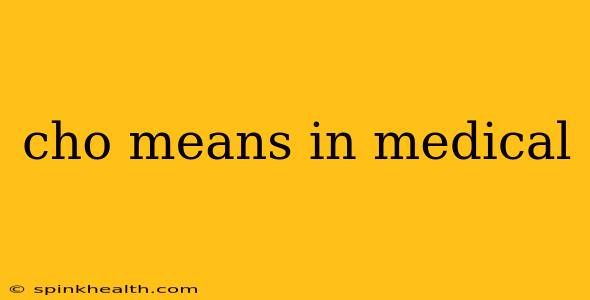Cho Means in Medical: Unraveling the Mystery of Cholecystokinin
The abbreviation "cho" in a medical context almost always refers to cholecystokinin (CCK). Let's delve into what CCK is, its function, and why it's important in medicine.
Imagine this: you've just sat down to a delicious meal, rich in fats and proteins. Your body is about to embark on a complex process of digestion, and a key player in this orchestration is cholecystokinin.
What is Cholecystokinin (CCK)?
Cholecystokinin, often shortened to CCK, is a peptide hormone primarily produced in the small intestine. Think of it as a crucial messenger, relaying information between your digestive system and brain. Its main role is regulating digestion, specifically focusing on the release of digestive enzymes and bile.
Let's break down its actions:
-
Stimulates Gallbladder Contraction: When fatty or protein-rich food enters the small intestine, CCK is released. It acts on the gallbladder, causing it to contract and release bile into the duodenum (the first part of the small intestine). Bile is essential for emulsifying fats, making them easier to digest and absorb.
-
Stimulates Pancreatic Enzyme Secretion: CCK doesn't stop at the gallbladder. It also signals the pancreas to release digestive enzymes, crucial for breaking down proteins, carbohydrates, and fats. This coordinated action ensures efficient nutrient breakdown and absorption.
-
Appetite Regulation: Beyond digestion, research suggests that CCK plays a role in appetite regulation. It can signal satiety (feeling full) to the brain, helping to control food intake.
What Happens When CCK Levels are Abnormal?
As with many hormones, imbalances in CCK levels can lead to various digestive issues. While pinpointing specific disorders solely due to CCK dysregulation is complex, its role is implicated in conditions like:
-
Gallstones: Problems with gallbladder contraction, potentially linked to CCK dysfunction, can contribute to gallstone formation.
-
Pancreatitis: Although other factors contribute significantly to pancreatitis, issues with pancreatic enzyme secretion regulated by CCK may play a role in certain cases.
-
Obesity: Since CCK is involved in appetite regulation, dysregulation may contribute to obesity or difficulties with weight management. However, this is an area of ongoing research.
How is CCK Measured?
Measuring CCK levels isn't a routine clinical test. It's usually investigated only in specialized research settings or in cases of severe digestive disorders where other causes have been ruled out. The measurement is complex and often requires specific lab techniques.
Does "Cho" Refer to Anything Else in Medicine?
While "cho" almost exclusively refers to cholecystokinin in medical contexts, it's crucial to always consider the full context. Within a specific research paper or medical record, "cho" might be a shorthand or abbreviation unique to that setting. Always look for clarity and consult the appropriate documentation if unsure.
This exploration hopefully clarifies what "cho" means in a typical medical setting and reveals the fascinating role of cholecystokinin in the intricate process of digestion. Remember, this information is for general knowledge and does not constitute medical advice. If you have concerns about your digestive health, always consult a medical professional for accurate diagnosis and treatment.

